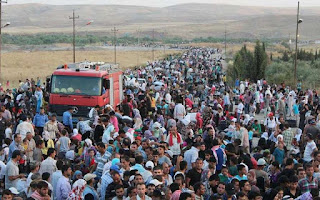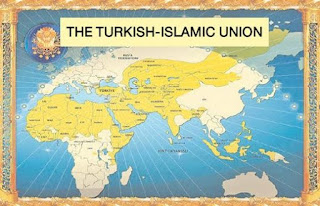President Obama, Secretary of State Kerry, and even
former Secretary of State Clinton should not be so quick to condemn those who
question the wisdom of mass refugee transfers to the United States
Of course, the liberal
media and progressive advocates will condemn anyone who questions them,
especially on such a controversial issue.
Such condemnation is then given the right progressive spin, like what
kind of threat are Muslim babies, mothers, and old people.
The intent is to entice
well meaning but gullible people into condemning Republicans and Republican
presidential candidates directly, and seducing Independents and Democrats who
might be genuinely concerned about the cause.
The truth, well so far no
one is talking about the truth or historical facts and lessons. To be honest, they cannot afford to discuss
it.
You will not find the
truth in the Qur'an (the Muslim holy book), you will find it in the historical
battle for dominance within the Muslim world between the bitterest of all
enemies, the sects within the Muslim faith.
The truth has been unfolding for 1,400 years but our liberal media
either does not want you to know the truth, or is oblivious, which is a much
greater concern to us.
There are two dominant
sects within Islam or the Muslim religion, the Sunni and the Shi'ite. For purposes of accuracy, there is confusion
in how to spell Shi'ite. Here are the results
of eight different sources on the proper spelling.
Is it Shi'i, Shi'a, Shia, Shi'ite or Shiite?
- Real Arabic is Shi'yan e Ali, a group of
fellows of Ali formed in life span of Muhammad pbuh.
- Commonly called Shia in arabic,
- Shiite's in English
- Shi'a in Arabic(شیعه)
- Shiite in English
- Shia in YA because it is easier to type it
- Shi'a - a sect in Islam
- Commonly it's spelled Shi'i or Shia
- I believe the best way is shia. Its the
easiest and it is spelled how it is said mostly it is used as shi'a.
As you can see, not even
the specialists agree.
What you do need to know,
and what Obama and company do not tell you, is both sects have rather radical
factions and as a result, they have been at war with each other for 1,400
years. The consequence of the war is stunning.
Reliable estimates of the
number of Muslims killed since 1948, is a staggering eleven million. In a 2007
research, Gunnar Heinsohn from the University
of Bremen and Daniel Pipes, director
of the Middle East Forum, found out that some 11 million Muslims were violently
killed since 1948, of which 35,000, (0.3 percent) died during the six years of
Arab war against Israel
The truth is, fellow
Muslims killed more than 90 percent of the Muslims who perished in Muslim
countries from 1948 through 2007.
Remember this does not
count 2008-2015, a time when ongoing wars in Iraq and Afghanistan were underway,
when there were many deaths from the Arab Spring and aftermath (between 2010 to
2012), the civil wars still underway since the Arab spring, most notably in Syria,
and violence throughout the other Arab countries.
During the Arab Spring,
rulers were forced from power in Tunisia ,
Egypt , Libya , and Yemen ,
while civil wars erupted in Bahrain
and Syria Algeria , Iraq ,
Jordan , Kuwait , Morocco ,
and Sudan and minor protests
in Mauritania , Oman , Saudi Arabia ,
Djibouti , Western Sahara,
and Palestine
Tuareg fighters returning
from the Libyan Civil War then joined the ongoing conflict in Mali
The death toll since 2007
could easily be more than one million meaning Muslims killed in conflicts in
Arab nations since 1948 could easily be approaching twelve million, with about
10,800,000 killed by fellow Muslims.
Historically, if you look
at the record for non-Muslims killed by Muslims over the 1,400 year history of
Islam the number is nearly 270 million.
Source articles for the numbers mentioned follow in subsequent articles.
In the past two decades
there have been two principal terrorist groups within the Islamic radicals, The
Islamic State of Iraq and the Levant (ISIL, ISIS or simply the Islamic State),
and their predecessor Al-Qaeda, the extremist Islamic group established in 1989
by Osama Bin Laden and responsible for the World Trade Center destruction.
Muslims pledge loyalty to
a Caliphate, a territory dominated by Muslims, in which Sharia Law is
implemented, the Islamic code of conduct.
From this point on, the differences between terror groups varies.
Just know that both
represent the Sunni sect. From a
terrorist point of view, the re-establishment of the Islam Caliphate is
necessary and obliterating all other Muslim and non-Muslim people within the
Caliphate is required.
With no national loyalty,
the radical Muslim fighters are loyal only to the Caliphate and therein lies
the core conclusion that accommodation is impossible, they are sworn to kill us
as the Demonic force behind the Jewish state and behind the persecution of
Islamic followers throughout the world.
What does this have to do
with Syrian refugees to America
It should be nothing but
that is not the case. Syrian refugees
want to remain in their homeland which is part of the disputed territory of the
Caliphate. Right now they face death if
they stay home.
However, there are two
issues with the refugees. First are they
loyal to the core beliefs of the terrorists and most are not. Second, will they assimilate into the
American culture if they come here or do they expect to bring their Islamic
culture to America as they
did in Europe and other areas.
Where substantial
concentrations of Muslim people have gathered over the years, not only do they
have to assimilate into the American culture, they also have to deal with
Islamic terrorists, and they must overcome the 1,400 year history of the Sunni
and Shi'ite struggle for dominance.
That is the perplexing
situation facing potential refugees to the USA United States
These are the issues not
discussed by the president or the media but only by Paul Ryan, new Speaker of
the House, and concerned members of the House and Senate. Slow down Obama or you will get it all wrong
again.
.

















































